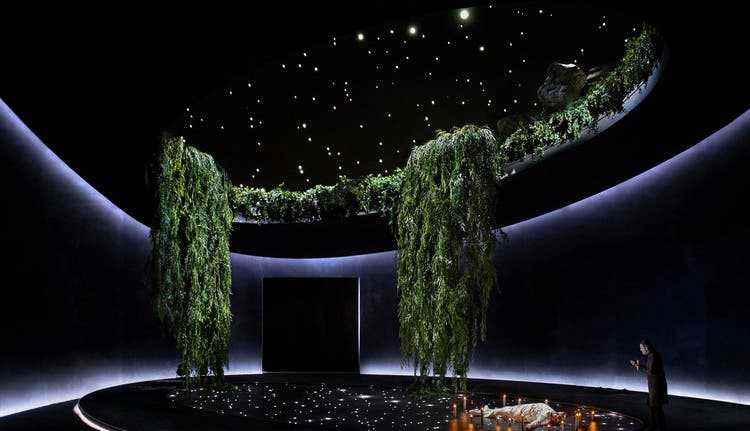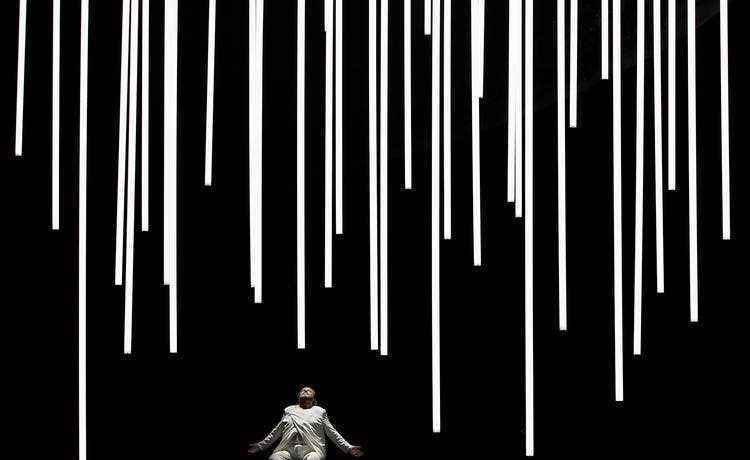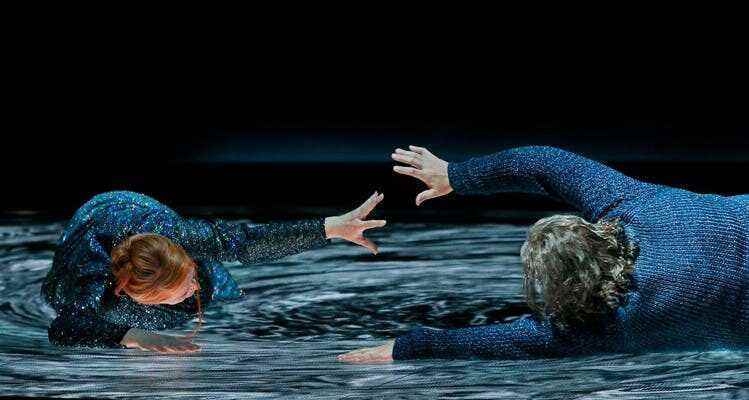The Bayreuth Wagner Festival starts with “Tristan and Isolde” and all sorts of scandalous noise. What’s behind the excitement?
Sinking in the love vortex: Isolde (Catherine Foster) and Tristan (Stephen Gould) can’t get hold of each other. Scene from Roland Schwab’s Bayreuth new production for the opening of the festival.
The Green Hill has become parched. The heat and drought have visibly affected him. On the opening day of the Richard Wagner Festival, temperatures in Bayreuth are well over 30 degrees. The air is boiling in the Festspielhaus, which has neither air conditioning to speak of nor modern fire protection. Of course, the heated atmosphere could also be symbolic of the current situation at the festival: controversies and scandals are nothing new here, but this time the scandal kitchen is simmering.
Whether sexism and allegations of abuse of power, line-up changes caused by the pandemic or the ongoing renovation of the historic festival hall: the list of construction sites for the festival management is long. In the meantime, Katharina Wagner herself has called for “structural reforms”. The 44-year-old director, a great-granddaughter of the composer, has been the sole director of the festival since 2008, from 2015 to the present day. Her current contract expires in three years. Whether it will extend it depends on fundamental reforms, as Wagner said shortly before the opening of the festival. What she means specifically, however, she leaves open.
personal carousel
It is likely to be a complex bundle of questions and problems, especially since many sides traditionally want to have a say at the Bayreuth Festival, not least the Bavarian state and Berlin federal politicians (as the most important donors). For Katharina Wagner, the central issue is her artistic decision-making authority, which is still being questioned to this day. And it probably also affects a prominent personality: Christian Thielemann.
The conductor, one of the leading Wagner exegetes of our time, is conducting Lohengrin in Bayreuth this year. As can be heard from musician circles, the rehearsals are said to have been rough. You know that from Thielemann from his time at the Deutsche Oper Berlin, the Munich Philharmonic and the Saxon State Orchestra in Dresden. Anyone who hires him brings a “baton autocrat” very old school into the house.
It’s no secret that the relationship between Katharina Wagner and Thielemann has cooled down noticeably. Apparently she wants to push him out of Bayreuth, just like Nikolaus Bachler did at the Salzburg Easter Festival. The only problem is that Wagner himself strengthened Thielemann’s position when she named him the first music director in the history of the festival in 2015. His contract expired in 2020, but the Wagnerians love him.

Unredeemed death in front of hanging gardens: Stephen Gould (Tristan) and Markus Eiche (Kurwenal, right) in the third act.
Incidentally, when Thielemann conducts, the tickets also sell particularly well. Even in Bayreuth, which used to be overbooked, this is no longer a matter of course: this year, tickets were still available online and even at the box office, although there are around two hundred fewer seats available due to the ongoing renovation of the Festspielhaus. There should be corona-related returns, it is officially said. At a press conference, Katharina Wagner also spoke of a general “declining audience” as a result of the pandemic, which can be observed everywhere.
In general, the pandemic remains present. In the new “Ring” cycle, which starts on Sunday, the conductor Pietari Inkinen, who was suffering from Corona, had to be replaced by Cornelius Meister. Meister was actually supposed to conduct the opening premiere of “Tristan und Isolde” – which in turn was taken over by Markus Poschner, the chief conductor of the Orchestra della Svizzera italiana, at short notice.
The fact that five new productions are being shown for the first time is also due to the pandemic: as an emergency solution if the “Ring” performances are canceled due to Corona. Roland Schwab was not commissioned with the “Tristan” production until the end of 2021, which makes a concise penetration more difficult. In his direction, Schwab relies on the eternal, romantically elevated love of Tristan and Isolde.
Good and evil
“Forever” is written in red letters in ancient Indian Sanskrit. This applies not only to this paradigmatic pair of lovers, but also to Arthur Schopenhauer. The philosopher’s writings form the intellectual background to “Tristan,” and like Schopenhauer, Wagner was fascinated by Buddhism. For the stage, Piero Vinciguerra created a single arched space that opens upwards. Clouds pass by in video projections until the stars twinkle. The lovers either lose themselves in projected whirlpools of love – or splash happily in the water.
The costumes by Gabriele Rupprecht pick up on the clear distribution of roles in good and evil, which the director carries out: Tristan and Isolde wear white, Kurwenal by Markus Eiche and Melot by Olafur Sigurdarson wear black, Georg Zeppenfeld’s brand wears both. In addition, the direction puts the focus on the characters themselves. That can work if the voices participate. Unfortunately, Stephen Gould had intonation problems as Tristan at the premiere. Zeppenfeld is completely different: in his role portrayal of the deceived king, beautiful singing, dramatic urgency and verbal expression intertwine. In contrast, the intelligibility of the text was a central problem in both Catherine Foster’s Isolde and Ekaterina Gubanova’s Brangäne.

Waiting for enlightenment from Isolde: Stephen Gould as Tristan in the new Bayreuth production of “Tristan und Isolde”.
Markus Poschner, on the other hand, succeeds in giving his Bayreuth debut, which was scheduled at short notice, a prickly interpretation, nuanced through to the most fragile piano. In addition, Poschner knows how to develop tempos over a large area and with a wide breath, without stretching them – also thanks to a crystal-clear articulation. This independent approach makes it clear how worthwhile it is to liberate the Wagner sound from its fixation on Thielemann’s romantic opulence. If Bayreuth also wants to have a style-defining impact on music, this festival must be an open, agile workshop for Wagner interpretation.
After all, the exciting conductor (and contralto) Nathalie Stutzmann was engaged for the revival of “Tannhäuser” next summer. And the new production of “Parsifal” by Jay Scheib is to be directed by the Spaniard Pablo Heras-Casado in 2023. He is equally at home in contemporary music as in historical performance practice.
